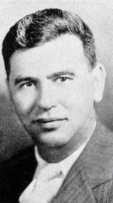Richard (Feuerstein) Firestone was born in Vienna, Austria on November 11, 1888. After graduating from the Gymnasium summa cum laude, he attended the University of Vienna, and in 1912 received his Ph.D. in romance and Germanic languages and literatures with a thesis titled “Friedrich Hebbel und die Stuermer und Draenger.” After his postgraduate studies at the University of Munich and Sorbonne University in Paris, he became a professor of French and German at a Viennese college, where he taught for six years. In 1920, disillusioned by the deteriorating social conditions of the old continent after World War I, Firestone left for America. En route on the steamer, he met Augusta Holland who became his wife soon after he arrived in the United States. Following a short fellowship at the University of Pittsburgh, Firestone was appointed in September of 1921 as Professor of Modern Languages at Rollins College in Winter Park, Florida, a position he held until his death on September 5, 1944.
At Rollins, Professor Firestone taught Greek, French, German, and comparative literature, while possessing a working knowledge of Latin, Spanish and Hebrew. It was to the students of Rollins College that he applied the best part of his pedagogic idealism, a philosophy and method of education which was an inspiration to all who came in contact with him. At the semi-centennial celebration in 1935, Firestone was awarded the Rollins Decoration of Honor, the first member of the faculty to receive such an honor for his distinguished services to the college.
In addition to teaching, Professor Firestone also conducted extensive research on the Renaissance and Elizabethan literature. Professor Carlton Brown of New York University once noted that Firestone’s work “made an important contribution to the interpretation of a considerable body of Elizabethan literature.” Upon his death, Professor Firestone left a wealth of unpublished manuscripts behind. The three-volume manuscript Eros Paedagogicus: An Approach to Elizabethan literature and Its Underlying Traditions was donated to the Rollins College’s Archives and Special Collections in 2007 by Mrs. Miriam Warner, daughter of Professor Richard Firestone, along with three other writings: An Analysis of Six Plays of Shakespeare,Rosalind and the Mystification of Male-Female In Elizabethan Literature, and Sapientia Socratica Jocoseria: An Inquiry about the Serio-Comic Socratic Wisdom in Ancient Classical Literature. As a result of this generous donation,these scholarly texts and their abstracts are available in an online collection and curated by Rollins College Archives and Special Collections in memory and recognition of Professor Firestone's enduring contribution to his field and to the Rollins College community.
Sapientia Socratica Jocoseria: An Inquiry about the Serio-Comic Socratic Wisdom in Ancient Classical Literature, Richard Firestone.
Eros Paedagogicus: An Approach to Elizabethan Literature and Its Underlying Traditions, Richard Firestone.
Table of Contents: Part I. The literary character of Robert Parry's Sinetes -- Part II. Robert Chester's Love martyr, or Rosalins complaint -- 1. The problem -- 2. The symbol of the Phoenix, the Pelican and the turtle -- 3. On alchemy -- 4. The figure of Rosalind in Elizabethan literature -- 5. The literary character of Love's martyr, of the Cantoes, and of the poems "Done by the best and chiefest of our modern writers" -- Part III. Gabriel Harvey's The scholars love, or Reconcilement of contraryes -- Part IV. Sonnet literature -- 1. Sidney, Spenser, Drayton, Daniel -- 2. Shakespeare's sonnets -- Part V. Gabriel Harvey - Appendix I. Eupheus or the anatomy of wit -- Appendix II. The mystification of William Drummond of Hawthornden -- Notes.
An Analysis of Six Plays of Shakespeare, Richard Firestone.
Annotated manuscript of an analysis of six plays by William Shakespeare: (1) As You Like It; (2) The Winter's Tale; (3) Love's Labors Lost; (4) Measure for Measure; (5) Twelfth Night; and (6) Cymbeline.
Rosalind and the Mystification of Male-Female in Elizabethan Literature, Richard Firestone.


